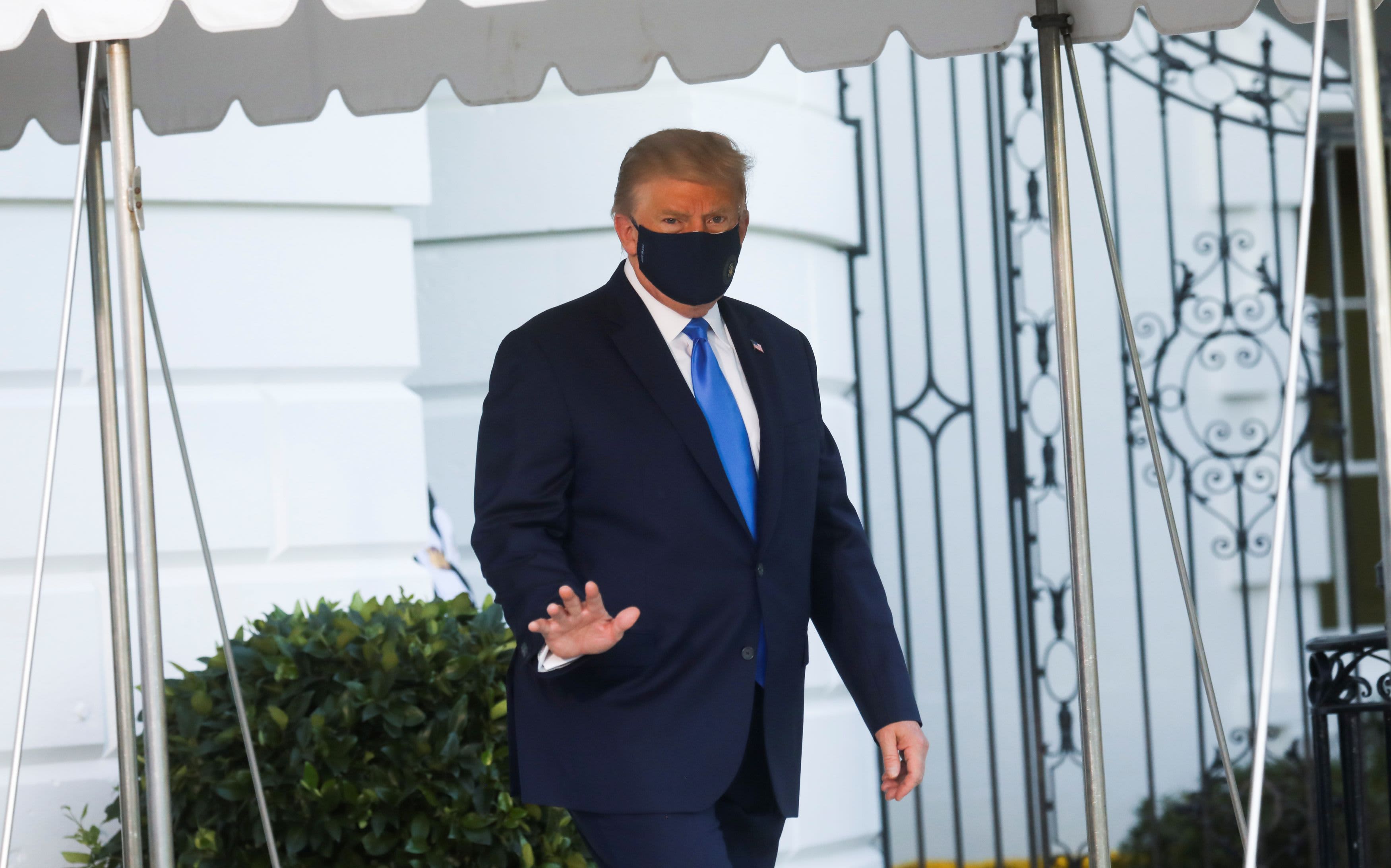Former Food and Drug Administration commissioner Dr. Scott Gottlieb told CNBC on Friday he believes the White House carefully considered all of its treatment options before it opted to give President Donald Trump the experimental coronavirus antibody cocktail from Regeneron Pharmaceuticals.
“This was a wholly appropriate decision to give him active therapy, and then it just became a choice of which therapy,” Gottlieb said on “Fast Money,” prior to Trump being taken to Walter Reed Medical Center “out of an abundance of caution” following his coronavirus diagnosis.
“I wouldn’t infer anything from the fact they chose the Regeneron product over another product — other than they probably had confidence looking at the data on the Regeneron product that it seemed to be the most effective of the products, given what they knew,” added Gottlieb, who led the regulatory agency under Trump from May 2017 to April 2019.
Not everyone in the medical community agrees with Gottlieb about the decision to give Trump an experimental treatment. Some shared concerns about the preferential treatment provided to the president, as the drug has not been approved by federal regulators, and others pointed to the limited available data.
On Twitter, as one doctor commented, “V.I.P. medicine doesn’t mean better medicine when there is no data.”
Regeneron confirmed it provided a single, 8-gram dose of its REGN-COV2 treatment for use by the president, whose coronavirus diagnosis was announced just before 1 a.m. ET Friday. Regeneron’s antibody drug is still experimental and has not received emergency use approval from the FDA, but it was provided in response to a compassionate use request.
CNBC’s Meg Tirrell on Friday reported that a “limited number of patients” had also received the drug on that basis after speaking with Regeneron’s chief scientific officer, Dr. George Yancopoulos.
On Tuesday, Regeneron said its REGN-COV2 treatment improved symptoms and reduced viral loads in non-hospitalized patients who have mild to moderate Covid-19. That was based on results for the first 275 trial patients. At the time, the company indicated it plans to “rapidly” discuss the early results with regulatory agencies, including the FDA.
Regeneron is not the only company developing antibody drugs; Eli Lilly and GlaxoSmithKline also are testing monoclonal antibodies, which experts have viewed as a promising potential Covid-19 treatment.
Regeneron’s REGN-COV2 is an experimental shot of lab-generated antibodies that mimics how the body would mount a reaction to a foreign invader. The goal is to boost the immune system’s defenses, rather than to wait on human biology to do its job.
In a memo provided Friday by the White House, Trump’s physician, Dr. Sean Conley, said the president was given Regeneron’s antibody cocktail “as a precautionary measure.” Conley also wrote that Trump “remains fatigued but in good spirits.”
Trump also has a low-grade fever, NBC News reported Friday afternoon, citing three people familiar with his condition.
The White House did not immediately respond to CNBC’s request for comment on the decision to give Trump the antibody drug.
Gottlieb said he thought that if Trump were going to receive any early treatments for Covid-19, it was likely to be Gilead Sciences‘ remdesivir. The antiviral drug has received emergency approval from the FDA, but for hospitalized coronavirus patients who are severely ill.
“I would have thought they would use remdesivir because there’s more data around that drug at this point and we are seeing that drug be used earlier and earlier in the course of the disease,” Gottlieb said, adding that he is “optimistic” about Regeneron’s drug, but it’s still very early.
“You might get a lot of benefit but you just don’t know,” he said.
However, Gottlieb pushed back on any suggestion that Trump receiving Regeneron’s treatment should be cause for alarm. He said virtually any other American, at this point of their coronavirus diagnosis, would just be monitored by medical professionals, hoping symptoms don’t intensify.
“For a president of the United States, if you have available therapy, I think you deliver it, especially if you understand the safety profile of these products and you believe they are otherwise going to be safe and aren’t going to worsen his condition,” Gottlieb said.
Some doctors are skeptical, however, of the decision to treat Trump with the antibody drug. “It is bad science, bad medicine and bad ethics to give unproven things to powerful people,” wrote Dr. Vinay Prasad in a Twitter post. Prasad is an associate professor of medicine and practicing hematologist-oncologist at University of California San Francisco.
“I will say that in no case have I heard of a patient, especially of the importance of the president, getting an experimental infusion of an antibody cocktail,” added Seattle-based pulmonologist Dr. Vin Gupta on MSNBC, who also pressed for more information from the White House.
In addition to Regeneron’s antibody cocktail, the president is also taking zinc, Vitamin D and the histamine-blocker famotidine.
The famotidine treatment was “speculative” at this point, even though there are studies looking at whether it could be beneficial on coronavirus patients, Gottlieb said.
“There are studies that suggest if you’re low on Vitamin D, Vitamin D supplementation can be beneficial, but you’d want to be on Vitamin D prior to getting sick,” he added. “I don’t think any of those drugs are problematic or could cause harm, I just don’t know that they’re going to provide a treatment effect in this setting.”
